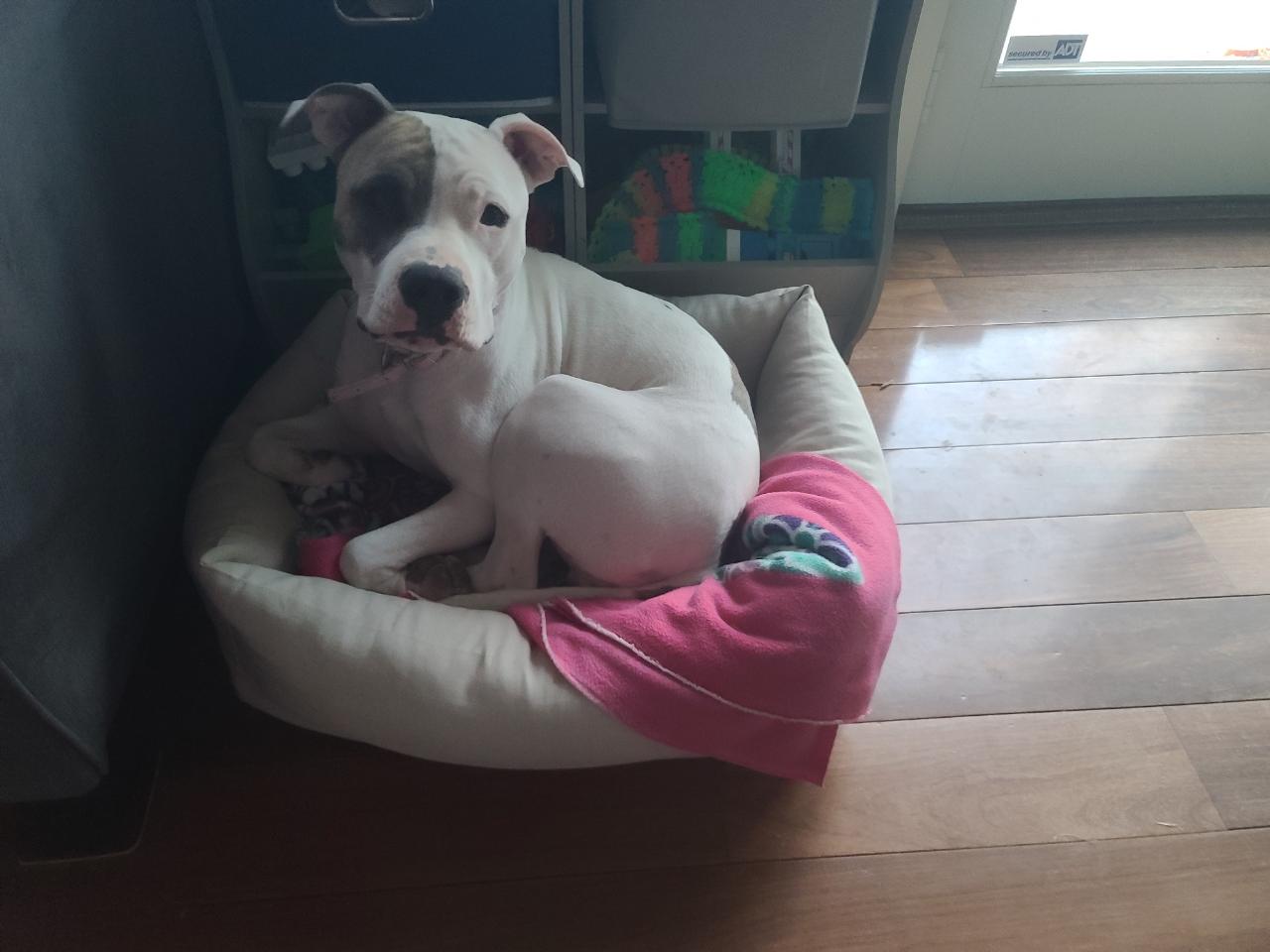“She’s gotta go,” she said, staring into her husband’s eyes. “We’re having a baby now. We can’t have that dog around.”
Her husband put his hand on Skya’s head. She leaned into the rub, and looked up lovingly into his eyes. Skya, a one-year-old Pitty mix, was adopted from the shelter as a rolly-polly, loving 20-pound little spirit. Full of love and hope for a family to call her own, the husband stepped up and said, “Yes, we’ll take her in.”
For a time, Skya was the focus of the young couple. Until the day the wife became pregnant. Skya went from basking in the loving acceptance and attention of her own family, reveling in treats and Bagel Beds, to being left for hours on end alone in the backyard.
All the while, she longed to know more. How to sit. How to come when called. How to not get upset in the presence of other dogs. How to behave inside so as not to anger her people.
She simply wanted to please her people. It’s what dogs do to earn our love and the safe haven of our homes.
But her people had no time. Even more so, no concern. Their focus shifted irrevocably, until the day the wife declared, “She’s gotta go.”
This, among countless variations, is among the myriad of reasons why dogs are loaded up in the family car once used to bring them into their forever home, and later dumped at shelters. Best Friends Animal Sanctuary reports there are 100,000 more animals (on top of the hundreds of thousands) at risk of euthanasia-by-shelter, owing to COVID-19, this year than in years previous.
The American Society for Protection of Animals (ASPCA) reports 920,000 shelter animals (390,000 dogs and 530,000 cats) lose their lives each year in shelters for lack of homes.
Closer to Colorado and an area of particular concern of yours truly, my own inquiry into dogs in need in San Antonio, Texas’s shelter reveals that up to 40 dogs per week are being walked down the aisle to the kill room.
That translates into just one example: demonstrating that in just that one shelter in a well-established, yet socioeconomically poor part of town, on any given day, between five and six healthy, adoptable, and loving dogs are losing their lives.
Knowing this and having a general awareness of so much more, Skya’s next-door neighbor, Amanda, could no more let her friends take Skya to the local shelter here in Colorado than she could say no to her more recent adoptee, a Pitty mutt named Joey.
Joey and Skya had become friends, and it was owing to that connection that when the opportunity came, Amanda stepped up.
“I just couldn’t bear to see her go to the shelter, knowing how full they are!” she shared with yours truly.
She and her husband don’t have a large backyard with acres for their four large dogs to run wild and free. They don’t have an abundance of free time in the throes of caring for two young boys and tending to two full-time careers.
They have just the one thing needed to help make the world a better place: ample space in their open hearts to say yes to a dog in need.
This morning, instead of sitting on the concrete floor, staring through glass doors in the cacophony of canine abandonment and wondering what it was she did wrong or where her people were, Skya is sitting in the company of Joey.
Near-identical twins with similar eye patches à la Spanky & Our Gang, they are looking upon the other pair of family dogs. The couple’s two young boys are joining them in loving upon a pack of four canine family members.
Joey had already learned how to be a good canine citizen, and it’s certain that following her responsible value system, Skya will learn much the same.
And their two boys will be making a homemade Mother’s Day card for their animal-loving mother come May, and celebrating the fact that she embraced hope where pragmatics may have spoken louder. That she and John stepped up in a world replete with chaos, destruction, and threat owing to things outside of their control and choosing to provide happiness and love where others could not.
And of all the teachings their two young boys could learn, saying yes to supporting a life in need already here on this earth and in need of care was an invaluable lifelong teaching, indeed.
Ways you can Help:
Foster with a reputable rescue. Donate. Adopt from your local shelter. Tell a friend—spay or neuter. According to the Humane Society of the United States, one unspayed female dog and her offspring can produce 11,167 puppies per year. Think: exponential growth. How many of them, do you believe, will wind up in shelters for want of home, and thus a candidate for euthanasia?
We, animal lovers, have more work to do to spread the word for homeless dogs (and cats). Let’s start by celebrating the moment when an enlightened family steps up and says yes to caring for another homeless dog.
~












Read 4 comments and reply